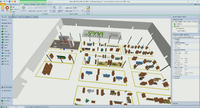INESC TEC develops tool to optimise manufacturing in SMEs
INESC TEC’s Centre for Enterprise Systems Engineering (CESE) has developed a software prototype that allows more agile scheduling and a more flexible design and management in make-to-order manufacturing.
Adopting more agile and flexible manufacturing systems is key to improve the competitiveness of European Small and Medium Enterprises (SMEs). With this in mind, the CESE team have developed the tool MOFFS (Make to Order Fast and Smart Scheduler) in order to solve production planning and scheduling problems in make-to-order systems.
The great scientific challenge was developing optimisation-simulation models to automatically create production and fine scheduling plans in job-shop systems. The approach consisted of using a mathematical programming model to solve the production planning model. This model determines when each order should start being produced, and provides an initial estimation of the delivery dates to clients.
The production plan is then used in the simulation model (developed with SIMIO) to determine the fine scheduling of the production orders in the work centre. The model that simulates discrete events takes into consideration various sequencing rules, setup times, allocation of workers, lists of materials and detailed operational ranges. Additionally, an iterative optimisation-simulation process was developed that aims to improve the estimations of the production plan, in terms of lead time and delivery dates. It is also important to stress that the optimisation and simulation modules are independent and interoperable.
The prototype has been used to generate optimised plans with over 100 production orders to be executed throughout a week, resulting in more than a thousand references.


The tool, used by the people in charge of planning at JPM Indústria, made it possible to better allocate specialised workers to the manufacturing orders, and to reduce the lead time. There was also an increased compliance with delivery times. The planning solutions have also demonstrated an increase in the usage rate of the bottleneck work centre to medium values above 80%.
According to Paula Silva, Director of Production at JPM, “with project MOFSS, JPM managed to find the existing bottlenecks in the shop floor. The information obtained with this tool was used not only to support planning, but also to implement improvements that help reduce costs.” Other advantages at JPM include faster plans and quality solutions.
MOFSS was funded by the Portuguese government, having also received funding from European project Manunet, which started in January 2014 and was concluded in December 2015. The project was led by the Spanish company INTERMARK, with PRODINTEC (Spain), INESC TEC and JPM (Portugal) as partners.
The CESE team involved in the project was composed of Alexandra Marques, Fábio Alves, Jorge Pinho de Sousa, Samuel Carvalho and Samuel Moniz.
More information on project MOFSS here.
The researchers mentioned in this news piece are associated with the following institutions: INESC TEC and UP-FEUP.


